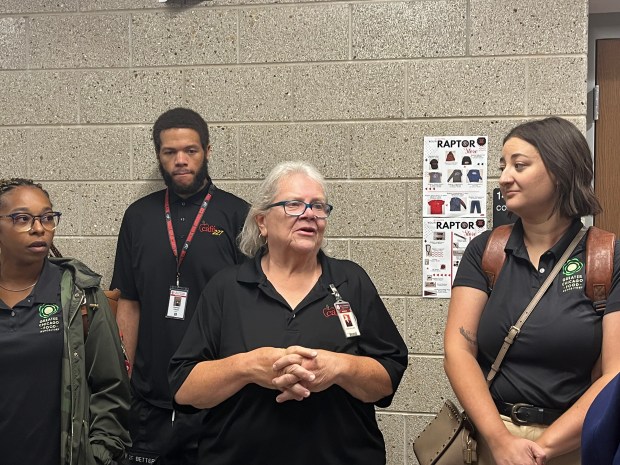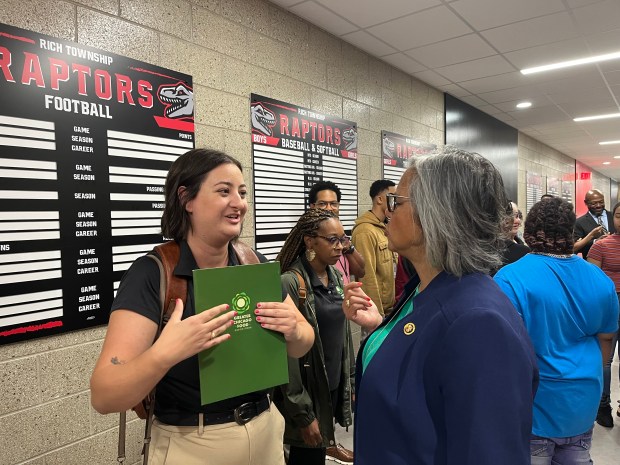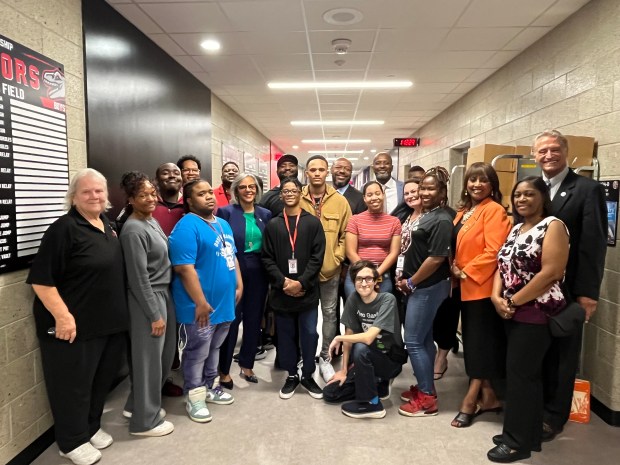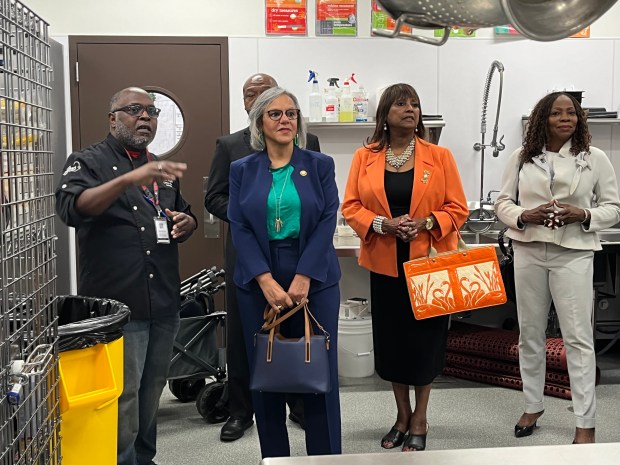U.S. Rep. Robin Kelly and two other Illinois Democratic delegates walked the halls of Rich Township High School Thursday to view the school’s commercial-grade kitchen and food pantry.
“It makes me very, very proud to represent this area,” Kelly said. “Many years ago I lived in this area, the town next door. My kids graduated from the school system. I’m very proud to see the school doing things like this. It’s very meaningful.”
Kelly, along state Rep. Debbie Meyers-Martin and Matteson Mayor Sheila Chalmers-Currin, toured the school ahead of the Democratic National Convention opening Monday in Chicago. Cook County Commissioner Monica Gordon and Richton Park Mayor Rick Reinbold also attended.
The Fine Arts and Communication Campus at 5000 Sauk Trail has undergone significant renovations over the last few years to create “a space that really takes care of the community,” said District 227 Superintendent Johnnie Thomas.
Other renovations include a television broadcasting production area, an athletic director’s office with medical equipment for treating injuries, a large weight room, a gym featuring a 200-meter indoor track and an armory for the naval cadet program.
“The more attention and focus we can put to making sure that we are funded in a supportive way, and that we have the support of the community, allows for us to do great ideas,” Thomas said. “A lot of times, when people hear ‘no’ constantly, it just it stifles creativity.”
The tour started in the $1.4 million commercial-grade kitchen equipped with appliances including an oven, grill top, griddle, bakery oven, steam tables, refrigeration units and extensive prep space. The kitchen also features a new walk-in cooler and freezer, and a storage room.
Culinary instructor Darius Bright helped design the kitchen to teach students proper food handling techniques. His goal is to equip them with the skills needed for careers in fine dining or hospitality management, he said.
“What we produce here, and what we do in terms of real life experience, has done well for the kids in terms of what it is to become a chef or work in the hospitality industry,” Bright said.
Students in the program can also get their food handler certification, a required credential in Illinois for most positions in the food service industry. This year, Bright said they are adding Occupational Safety and Health Administration certifications for workplace safety to the curriculum.
Bright said the demand for this program was high.
“There’s not a lot of fine dining out here, as it would be in like Homewood, Flossmoor or Tinley Park,” he said.
After touring the kitchen, the Illinois delegates moved on to the school’s food pantry, which opened in 2023 through a collaboration with the Greater Chicago Food Depository, which supplies items to Chicago-area food pantries.
The pantry serves between 80 to 125 families a month, said Betsy Williams, the district’s director of food services.
“When you talk about those numbers, there’s eight or 10 members in the family, so it’s hundreds and hundreds of and hundreds of individuals that we help,” Williams said.
At the time of opening, District 227 was the only school district in the south suburbs to partner with the food depository to operate a pantry.
Families also receive a card from the Greater Chicago Food Depository that gives them access to other pantries the depository serves, Williams said. They can place orders online that are packed by student volunteers and delivered curbside.

Some volunteers are students with disabilities who assist at the food pantry as part of their job skills training. Others volunteer because they are passionate about supporting the pantry’s mission,” Thomas said.
“It’s teaching young people that you need to give back, it’s important to volunteer,” Kelly said. “Someone told me once if all of us volunteered just one day the whole year, the world would be a better place, and I believe that.”
Addressing food insecurity through initiatives aligns closely with her broader health care efforts as a politician, Kelly said.

She said of the top 10 diseases that people die from, a lot can be reflected back on what people eat, saying too many people live in food deserts.
In a small space connected to the pantry is an all-in-one washer and dryer, along with bins full of toiletries and other household bathroom items the school keeps on hand for unhoused students.
“We wanted to create a space where our homeless students could come and wash and dry their clothes. So it’s more than just just the food pantry,” Thomas said. It’s a space that is really protecting our children and making sure for us they’re ready for school, they’re not hungry, they have clean clothes.”

Other renovations at the district’s Olympia Fields campus are underway Thomas said.
“People are starting to see that schools are more than just an educational hub,” he said. “It’s a space that really takes care of the community.”
smoilanen@chicagotribune.com




